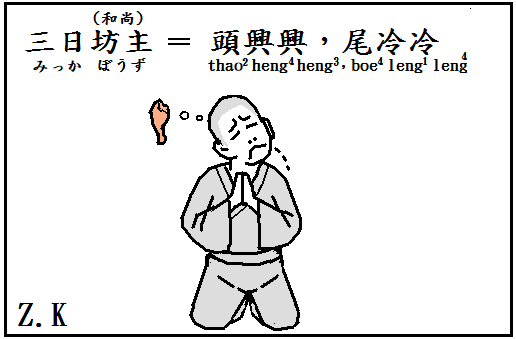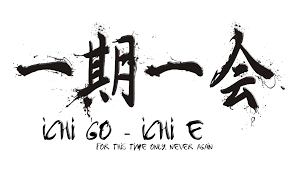新埔捷運站1號出口 旁邊7-11巷子進入20公尺 看到夏朵美髮左轉

三天和尚 症候?
The Three-Day Monk Syndrome zen habits
‘Ninety percent of life is just showing up.’ ~Woody Allen
By Leo Babauta
In the past, and sometimes still, I am often what the Japanese might call a “three-day monk“.
It’s a very common syndrome — you get obsessed with something for a short time, and pour yourself into it, only to stop a few days (or a week or two) later.
How many times have you done this? Be honest. We’ve all done it many times — with exercise, with a blog or journal, with learning something new (like a language), with a new hobby.
A three-day monk gets very little accomplished, because a short intense burst isn’t enough to accomplish meaningful change. How can you get in shape if you exercise for a week and then stop? How can you learn a language, learn programming, learn to write a novel … if you just spend a few days working on it every six months?
The key then is not being a three-day monk, but saying a 20-minute every-day prayer. Not literally a prayer (except that in a sense anything done with devotion is a prayer), and not literally 20 minutes — you can do it for whatever amount of time works for you.
But do show up.
If you can show up every day, and not just do it for a few days, you’ll create meaningful change — in your life, in the lives of others, in the world.
Let’s take a look at how to keep showing up.
How to Beat the Three-Day Monk Syndrome
There is no formula for beating this syndrome, except to do whatever it takes to just show up. You might do very little, you might make mistakes, you might utterly fail. But you show up.
Here are some things that work for me:
Don’t force yourself. This isn’t about discipline or the torture of making something you hate happen by brute force. It’s about doing something you want to do. So instead of forcing yourself, frame it in a way that makes it something you enjoy doing. A run can be painful drudgery, or a lovely time clearing your head and enjoying the outdoors. Learning Spanish can be a chore you dread, or a way to enjoy great music, learn about a distant culture, discover new films. Trust me: you won’t get very far doing anything if you have to force yourself every day.
Gradually increase. Throwing yourself full force into something might work for a little while, but it also makes it hard to keep showing up every day. Start small, and each day, just show up. Gradually increase what you do, so that each step along the way it still feels easy and fun.
Use momentum. Once you’ve gotten going, use the inertial force to keep going. This again is a matter of how you frame things. Each day, showing up can be like trudging up a hill with weight on your back, or it can be like falling forward down a hill. When I run down a hill, it’s almost like I’m falling, except that I keep my feet under me so that I’m falling upright.
Remind yourself of what you want. You’re doing the activity (exercise, language learning, meditation) presumably because you want to do it. When we stop doing something, it’s because we’ve forgotten that we wanted it. We start to fear it for some reason, and try not to think about it. Instead, think about it, but remind yourself of why you started doing it in the first place. That might mean reading some motivational articles, watching some videos that motivate you, looking at some pics that motivate you, referring to a vision in your head. Or just bookmark this article and come back to it every day.
Play some music. When I don’t feel like working out, I’ll play a song. Yesterday it was Eminem’s “Lose It”. I became so instantly pumped up that I went to the rowing machine and shredded it for 3 minutes and exhausted myself. So maybe that was a bit of overkill. But there’s no doubt that it helped me to show up.
Stop with the doubts. Everyone has doubts sometimes, but they can either be overcome, or they can stop us from showing up. Do you doubt that you can stick to something for a long time? Forget about the doubt, and just do it. Be sure that you’re going to do it at least one more time. When you prove yourself right, make a note of that, and then be sure that you’re going to do it one more time. Don’t even allow yourself to imagine that you won’t.

一生只有一次 (一期一會)
Once in a lifetime vs once-in-a-lifetime
Once in a lifetime is a phrase that means an event or opportunity that is not likely to be repeated. The phrase once in a lifetime was first recorded in 1854, and can mean an event or opportunity that literally will not be repeated within one’s lifetime, or more usually, is an exaggeration that refers to an event or opportunity that happens very infrequently.
Every Encounter is a Once in a Lifetime Occasion
--------
‘One time, One meeting’
Ichi-go ichi-e (Japanese: 一期一會, lit. "one time, one meeting") is a Japanese four-character idiom (yojijukugo) that describes a cultural concept of treasuring the unrepeatable nature of a moment. The term has been translated as "for this time only," and "once in a lifetime." The term reminds people to cherish any gathering that they may take part in, citing the fact that any moment in life cannot be repeated; even when the same group of people get together in the same place again, a particular gathering will never be replicated, and thus each moment is always a once-in-a-lifetime experience. The concept is most commonly associated with Japanese tea
‘Ichi-go ichi-e’ is a Japanese idiom which roughly translates as ‘one time, one meeting’. It is used as a reminder that each encounter we have with a person or group of people will never be repeated. Even if we meet with those people regularly, that one particular encounter with them is unique.
According to the Japanese Tea Culture Glossary, the expression has been traced back to a 16th century Japanese tea master, Sen no Rikyū. The concept was later elaborated on in the 19th century by Ii Naosuke: “Even though the host and guests may see each other often socially, one day's gathering can never be repeated exactly. Viewed this way, the meeting is indeed a once-in-a-lifetime occasion.”
Indeed, it’s interesting to reflect on how our experiences with family and friends over the holidays, or even with our co-workers when we return to our routines, might take on a deeper significance if we were to view each encounter in this way.
We might sometimes feel that life is rather monotonous: we may see the same people, and do the same things every year. But if we can bring more mindfulness to these occasions we may find that life actually presents us with many new and unique moments, if we just adjust our perspective a little.










0 意見:
張貼留言